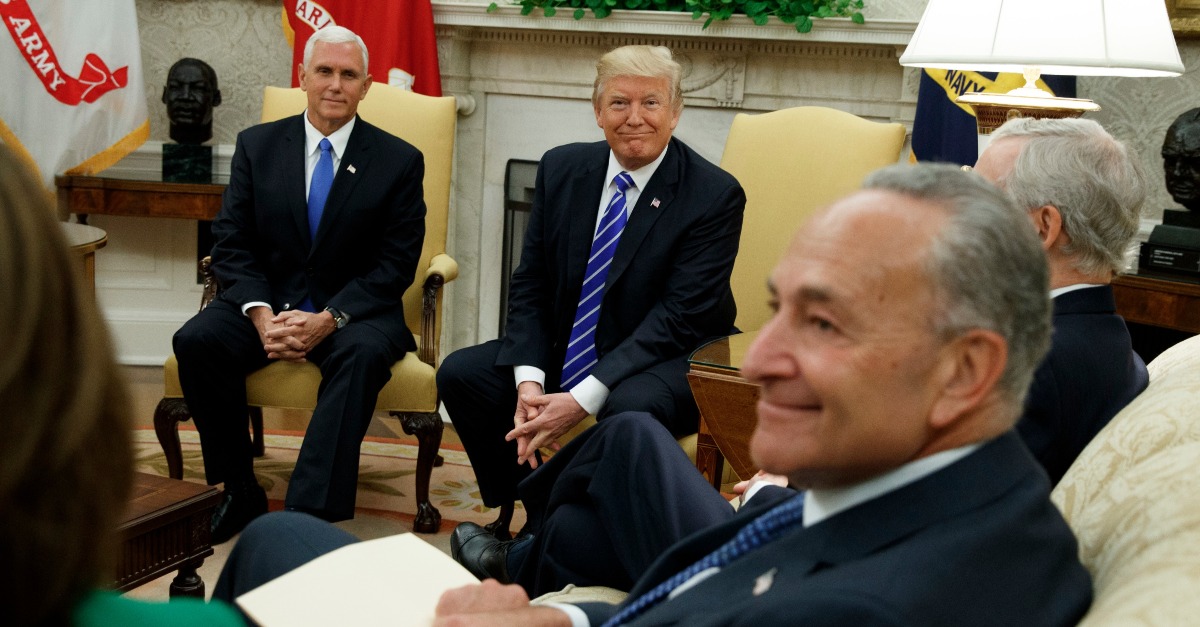Donald Trump may have small hands but from them have come some big milestones. Case in point, last week the president — after running a campaign on the central theme of unbalancing effete liberals in Washington — teamed up with Democrats Nancy Pelosi and Chuck Schumer on a spending deal to keep the government open for three months and temporarily raise the debt ceiling. Conservatives complained, liberals sniggered, Trump supporters twisted themselves into pretzels, but no one mentioned the borrowing cost of the agreement: approximately $318 billion.
Videos by Rare
That was enough for the history books. When Trump micro-signed the legislation, the United States for the first time officially amassed $20 trillion in national debt. The 318 congressmen and 80 senators who who backed the deal are accomplices in this travesty, all the more so since the next fiscal expiration is now they strategically scheduled for December, when every Washington lawmaker will be antsy to skip town for the holidays. In other words, we’ll hit $21 trillion and $22 trillion, too, because even in a pan-Republican government, the political will to trim the budget doe not exist.
And those numbers really are lowballing it. If you froze the fiscal picture back in 2012, America’s total outstanding financial commitments would have amounted to more like $70 trillion, economists say, of which Social Security and Medicare account for about 77 percent. That figure is likely to have decreased a bit in the intervening five years, as the economy has recovered somewhat and revenues have increased. But the federal government has still done precisely nothing to address our bleeding entitlements, which means the bulk of the problem persists. Debt will only continue to grow as entitlements eventually eclipse the federal budget, crowding out spending on other programs, forcing either drastic cuts or gargantuan budget increases.
RARE POV: The federal government’s overspending is the one controversy Donald Trump won’t tackle
American exceptionalism is a potent brew. Sip enough of it and you too will start to believe that the United States by virtue of its power must be in good fiscal condition, or better at least than those Mediterranean nations with their sun-dappled corruption and addictions to bureaucracy. Not so. America’s debt-to-GDP ratio is about 106 percent, greater than the United Kingdom (89 percent), Germany (68 percent), Canada (92 percent), France (96 percent), and even notorious economic basketcase Spain (99 percent). Russia’s debt-to-GDP is an enviable 17 percent, a point on which the Washington town criers who insist we be better than Moscow at everything are curiously silent. Of the major Western nations, only Italy and Greece are closer to the icy beckoning finger of fiscal calamity than America — hardly the bedfellows we want.
Earlier this week, Martin Walsh wrote an excellent piece for Rare arguing Donald Trump was right to strike his fiscal grand bargain with Democrats because his intention was to pressure congressional Republicans and sharpen them for future battles. While I agree with Walsh’s analysis, I disagree with his support for the deal. This national debt and overall spending crisis is simply too daunting for Trump to squander a precious opportunity by playing political games. A stick rather than a carrot was what the GOP needed: “You want the debt ceiling hiked, then I need spending cuts and steps towards entitlement reform,” with any balking appropriator lambasted in pure Trumpese. It could have been both a policy and an intra-party win; instead the president went turncoat. Who knows if he’ll ever get around to tackling the debt crisis he’s now helped advance?
RARE POV: Rand Paul: Don’t raise the debt ceiling without reform
There are plenty of culprits beyond Trump and this Congress, of course: blame Barack Obama, who tantalized Republicans with the possibility of a fiscal grand bargain in 2011 and then cynically reneged. Or John Boehner who spent his entire speakership failing to effectively wield Congress’s power of the purse. Or congressional Democrats for ignoring the problem Or even George W. Bush for his unpaid-for wars and security bureaucracies.
The neo-Keynesians are in spectacular repute, too, and not just partisan jokers like Paul Krugman who suddenly discovered, upon Trump’s election, that “deficits matter again.” After the recession hit in 2008, Keynes’s heirs assured us that once their stimulus measures got the economy going, the fiscal imbalance would right itself. And while the rate of increase on the debt has slowed, it’s still larger than our total output during a supposed recovery. What’s needed is a little of that tea-party energy to squeeze spending cuts (or at least another sequester) and entitlement reform out of Congress—a course correction that’s badly overdue. Problem is, those Gadsden flags have all been lowered. No one seems to care anymore.



